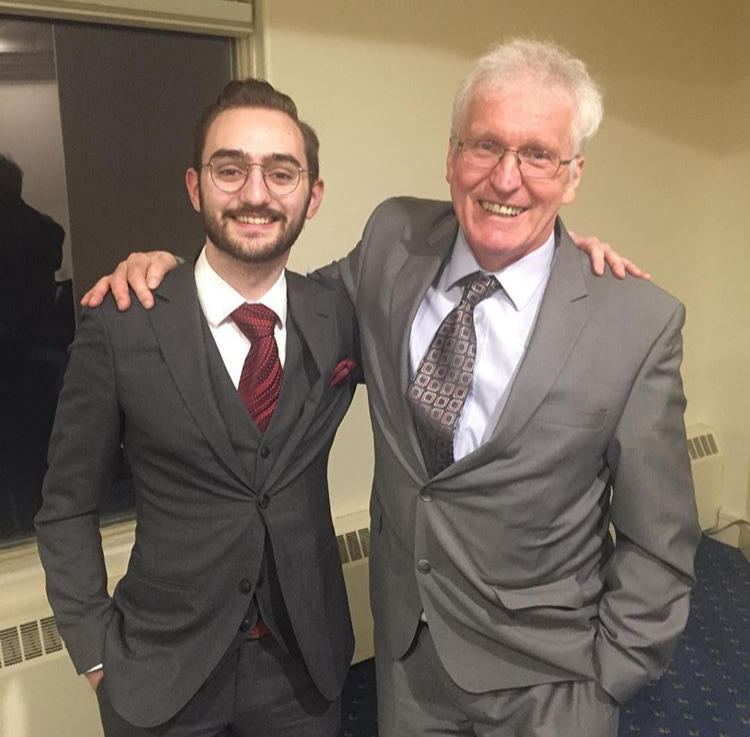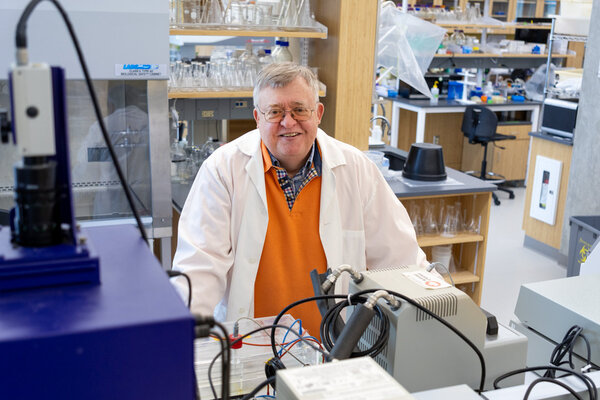
New USask graduate values research experiences at Centre for Quantum Topology and Its Applications
Robert Cornea will receive a Bachelor of Science (honours) degree in mathematical physics during 2021 Spring Convocation
By Shannon Boklaschuk
When Robert Cornea first became a student at the University of Saskatchewan (USask), he wasn’t sure what he wanted to study.
That changed after taking a second-year course offered by the Department of Mathematics and Statistics in USask’s College of Arts and Science.
“The professor was Dr. Steven Rayan and that course alone brought out a deep love of math that I honestly didn’t know I had in me,” said Cornea. “It was Steve who brought my attention to mathematical physics, since I still wanted to do physics but also do math, and so I decided to pursue mathematical physics—and, ever since then, I didn’t look back.”
Cornea is now set to receive his Bachelor of Science (honours) degree in mathematical physics during USask’s 2021 Spring Convocation. Due to the ongoing COVID-19 pandemic, Convocation celebrations will be held virtually this spring. It’s something that doesn’t faze Cornea, who was born and raised in Fort McMurray, Alberta, and who graduated from high school in 2016.
“That year, 2016, was the year that the Fort McMurray wildfires happened and a large portion of the city either burned down or was severely damaged. I got evacuated, as did everyone else, on May 3, 2016, and my graduation got cancelled because of it,” he said. “So, unfortunately, this isn’t my first experience with graduations being cancelled or interrupted due to natural disasters.”
Cornea said the best part of studying at USask was “being able to actually accomplish goals that my high school self would’ve thought to be impossible to achieve.” Now, with his newly minted Bachelor of Science degree, Cornea’s sights are set on the future, starting with a master’s degree in pure mathematics that he will begin at the University of Waterloo this fall. He also hopes to complete a PhD in math, focusing on geometrical issues related to theoretical physics, and become a professor one day.
Throughout his time at USask, Cornea excelled academically. He received several major awards—including the Roger Phillips Scholarship in Physics in 2019, from the Department of Physics and Engineering Physics—and he was accepted into the Golden Key Honour Society in 2018.
Cornea also received an Undergraduate Student Research Award (USRA) from USask’s Centre for Quantum Topology and Its Applications (quanTA), which funded his summer research in 2020. He studied the moduli space related to the Yang-Mills equations.
“The equations help us to describe and understand the fundamental forces at play in nature, including electromagnetism. We tried to understand what happens to these equations as one lets the solutions get bigger and bigger in a particular way. In math jargon, we studied the asymptotics of the moduli space,” Cornea said.
“We wanted to see if we can describe the solutions at infinity—the ones too large to fit into the moduli space—because these solutions hint at interesting new mathematics and new physics. I will be continuing this summer with another quanTA USRA and Dr. Rayan and I are putting all of this into a nice article summarizing these facts, which I hope to get published.”
Outside of the classroom and quanTA, Cornea took part in numerous extra-curricular activities on campus. For example, he served on the executive for the Math & Stats Student Society (MS^3) and held the role of academic coordinator for the 2019-2020 year.
“Being academic coordinator has helped me become a more effective teacher and has helped a lot in securing my confidence in my knowledge I’ve gained from my undergraduate degree,” he said.
“This year—2020-2021—I remained on the executive for MS^3, but instead I was the vice-president internal. As vice-president, my duties were to oversee and help out with any MS^3 event being offered. This helped tremendously with my ability to schedule and give advice in areas that I otherwise wouldn't have thought about before.”
Cornea was also involved with the College of Arts and Science’s Student Recruitment Ambassador program, representing the mathematical physics program. He answered questions from students and prospective students alike, touching on topics such as how to study, what courses to take if you are interested in mathematical physics and where to eat in Saskatoon.
In addition, from 2017-2019, Cornea was involved with the University of Saskatchewan Students’ Union (USSU) Pride Centre, volunteering there for about four to five hours per week.
“It was a great experience for me to learn about issues and cultural impacts within the LGBTQ+ community that, as a straight cis male, (I) would have never thought of before,” he said. “I met incredible people volunteering there, and I cherish the memories and teachings I’ve learned from the Pride Centre.”
Cornea said he’s very grateful for the support he received from his family throughout his undergraduate studies, particularly the “constant support and advice” from his mother. He also feels very fortunate to have worked with Rayan—a faculty member in the Department of Mathematics and Statistics, the director of quanTA and the chair of the interdisciplinary mathematical physics program—whom he considers a mentor and a friend.
For students who are just beginning their studies at USask, Cornea’s advice is to ask questions and to “never be afraid to try something new.”
“You never know, you might just take a course on a subject you were terrified (of) or struggled with a lot in high school—and (you might) just surprise yourself at how talented and skilled at these subjects you really are,” he said.


